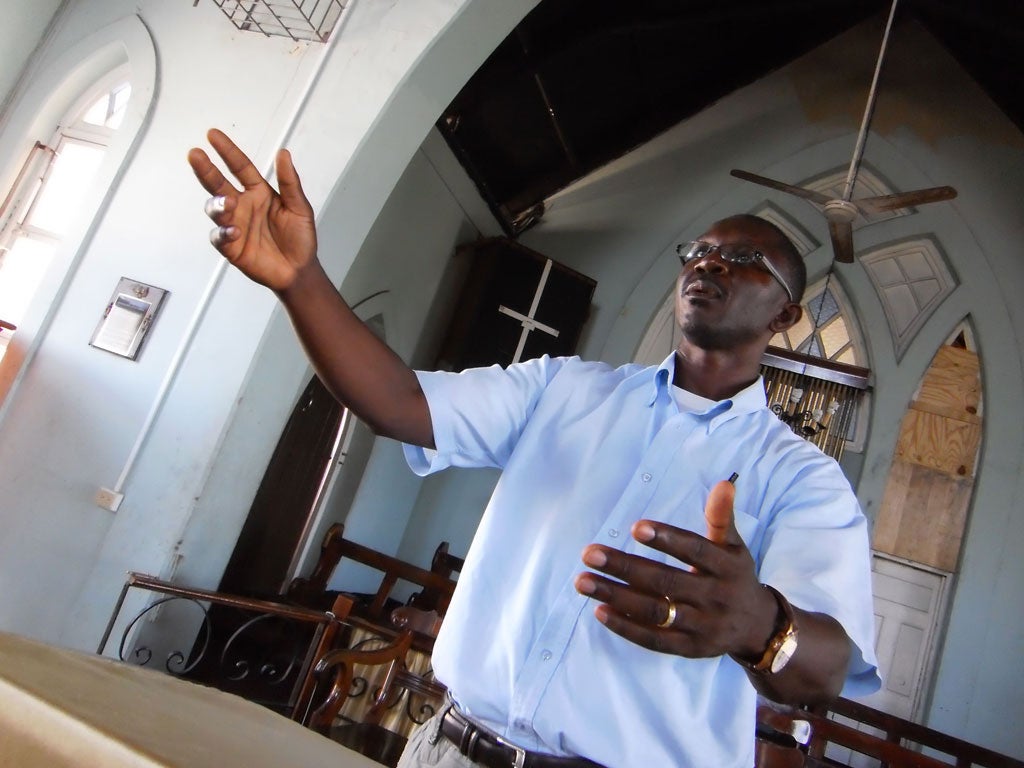Reverse Missionaries, BBC2, Friday Storyville: Who Is Gorky? An Abstract Life, BBC4, Monday
Fly in a fired-up preacher from a former colony to convert heathen Britain. What a brilliant idea! Just a shame that it feels as if we've seen it all before

Alan Partridge didn't really do it for me, except in one memorable sketch. It's the one when he's sacked by a TV exec, then spends the rest of lunch desperately pitching ideas: "Youth-hostelling with Chris Eubank? Monkey Tennis?" I can't watch any clever new programme now without imagining the commissioning process.
Take Reverse Missionaries: the idea is so forehead-smackingly obvious it's a wonder nobody's done it before. You take a preacher from a poor Christian country once colonised by missionaries, and send them to broken Britain, where they persuade some beer-belching chods to go to church. Brilliant! Repeat three times and you've got a miniseries packed with social commentary and car-crash moments. Have another glass of chablis.
So, in the first instalment we saw Pastor Franklin Small leave Jamaica for a village in the chavvy part of Gloucestershire. This is where Thomas Burchell was born, the 19th- century missionary who brought Christianity to Jamaica. He's Pastor Small's pin-up, and a cute subplot sees him retrace Burchell's steps to find his home and, eventually, his grave, all forgotten and overgrown. (Geddit? It's a metaphor!)
Pastor Small is charming and clever and full of enthusiasm, but wasn't always so: he was once a Yardie, who turned his life around by finding God. So he has the zeal of the convert. And he'll need it: in King's Stanley, the congregation is down to 17. The church has been given five years to boost attendance or it will shut. It's a familiar story.
Which is the problem. So much of Reverse Missionaries is a lazy airing of the bleeding obvious. We know that church-going is down; we know that communities are fragmented; we know we're all feckless heathens going to hell in a burger van. The more interesting question is why. Why has secularism not replaced Christianity with its own moral framework? Why is there such a tide of apathy? This sort of telly doesn't bother with answers: it's all about setting up clanking juxtapositions, then sitting back to peek through the fingers as awkward moments unfold. Such as when Kev, who is obese and wheelchair-bound, challenges Pastor Small's claim that God is great. "He hasn't been good to me," he says. He's got a point: he's in permanent pain and on medication, and he did have faith until his sister died aged 17. "I chose the path of destruction," he says, and lights a fag. Who can blame him for going off God?
What this programme does show, is how religion brings people together. Pastor Small's theology isn't all that persuasive, but he succeeds in organising a football match and a fete, and by the end, even Kev has turned out. When Kev makes the sign of the cross, whoever commissioned this must have been doing cartwheels.
As must Cosima Spender. She's the documentary-maker granddaughter of Stephen Spender on one side, and of the artist Ashile Gorky on the other. Gorky killed himself in 1948; in Who Is Gorky? she persuades her grandmother and mother to talk about the effect it had on their lives. "This doco is like group therapy," says her mother. "You've stirred the muddy waters."
Gorky was an Armenian refugee living in New York; he married Mougouch Magruder, the daughter of an admiral, and had two daughters. They had little money, and decamped to the country. During a harsh winter, he discovered she had slept with another painter, and went berserk: he pushed her down the stairs then hanged himself. Going back to the house where it happened is painful for his daughters, though the real tyrant turns out to be their mother.
Mougouch Fielding, now 90, is tricky and self-aggrandising and clearly a nightmare mother. "I didn't feel connected to Mummy," says Natasha, her younger daughter. "She never paid any attention to me." Cut to Mougouch, looking through a photo album. "[Natasha] always says she was so miserable. She wasn't." We follow them to New York and Armenia, where they find Gorky's village, but it's the scenes at the Spender home in Tuscany I liked best. They sit around moaning self-indulgently, as only rich bohemians can. It's like Chekhov comes to Chiantishire: an Alan Partridge idea that might just get commissioned.
Subscribe to Independent Premium to bookmark this article
Want to bookmark your favourite articles and stories to read or reference later? Start your Independent Premium subscription today.

Join our commenting forum
Join thought-provoking conversations, follow other Independent readers and see their replies